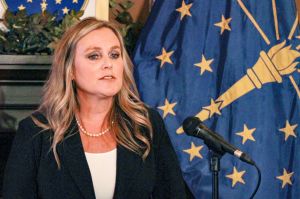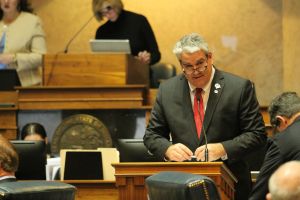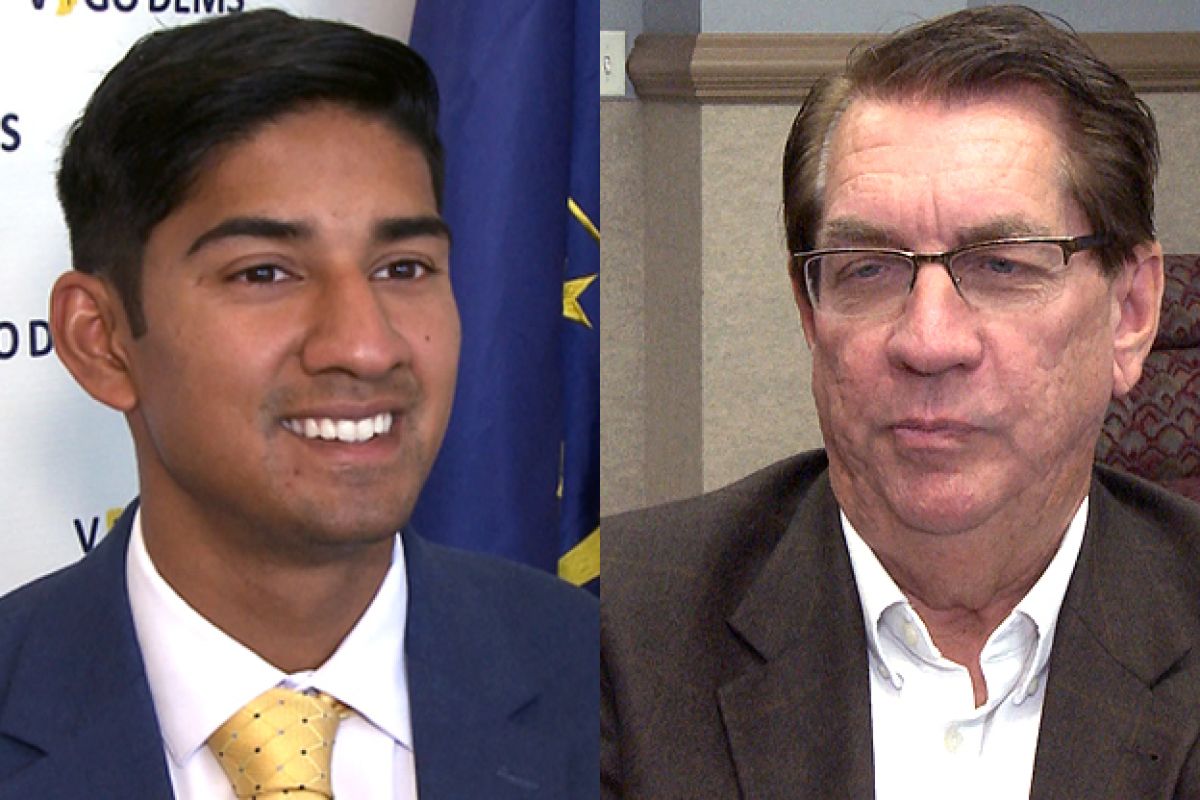
Terre Haute mayoral Democratic challenger Brandon Sakbun and Republican incumbent Duke Bennett (Joe Hren, WFIU/WTIU News)
Terre Haute voters will decide whether to stay with incumbent Republican mayor Duke Bennett for his 5th term, or elect someone new, Democratic challenger Brandon Sakbun – who has never run for office. Both are from Terre Haute.
Bennett, a 63 year-old Republican, has a bachelor’s degree from Indiana Wesleyan University. He was uncontested in the May primary.
Sakbun, a 27 year-old Democrat, is a graduate from IU's Kelley School of Business and served as a U.S. Army ranger. He defeated Pat Goodwin in the May Democratic Primary with 54 percent of the vote.
Read more: Duke Bennett Celebrates Marginal Victory In Terre Haute Mayoral Race
Early voting has already started in some areas, the general election is Tuesday, November 7.
Ask The Mayor host Joe Hren sat down with both to talk about their campaigns. You can hear the entire interiew in the YouTube videos below.
This conversation has been edited for clarity and conciseness.
Hren: Let's start with a general question - why should Terre Haute residents vote for you?
Bennett: I think my record stands for itself. We've accomplished a lot. Some of the baseline things that I think that are really important is the fact that we balanced the budget back in 2016, we've had eight straight years of balanced budgets, and we're in a really good financial position. The economic development growth we've seen with new businesses come into the community, new convention center, new police station, just a variety of investments we've made and private investment has come to the community.
We've seen more growth in the last 15 years than we've seen in the last 50. And so things are really on a roll here. And so that's what's exciting for me, that's why I'm jumping in this again, because I want to continue this progress and continue to do great things.
Sakbun: My version of the American Dream is a son of a young immigrant couple able to serve their country, serve their state, and serve their community. I'm focused not necessarily on re-litigating the past but moving Terre Haute towards the future. Economic development, quality of life, access to education, all these different fields. When you look at it from a municipal government perspective, you understand that we've got to invest in ourselves here in Terre Haute in the people, through housing revitalization, sidewalks, streets reimagined and really growing and modernizing our economy.
In early 2023, the United States Chamber of Commerce issued a dire warning to local governments, if they don't modernize their economies and change how they function, different communities could fall behind. And we're seeing that right here in Terre Haute, Indiana.
Hren: Bennett can say he has the experience of 16 years as mayor, others could say that's too much. Sakbun could say it's time for someone new, others could say we need experience in a mayoral candidate. What would you tell voters?
Bennett: I'm a public servant, that's the only reason why I got in this in the beginning. And, you know when the time is to go away, as I think most people would know, the voters can always tell us, every four years, when it's time for a change. There's no term limits in municipal government in Indiana. And so it's been that way from the beginning. And you know, there's a lot of mayors that's served a lot longer than me across the state.
I don't feel like I've been here too long at all. We're just really ramping up to get great things done, because we had to get our finances in order, you know, had to get through COVID. Obviously, there's a lot of things that have happened along the way that now we're positioned really well. Now's the time not for change, but to get these things done and roll these things out. And so that's the only reason why I'm running again, is because it's all the hard work we've put into this. Now it's time to deliver. And so I'm excited about this.
Sakbun: So I think experience sometimes can be looked at through a different perspective called entrenchment. We've done it this way. We've always done it this way. And that's really the mindset we need to get away from in government and politics. We've got to bring new folks to the table to have a conversation about how can government be more efficient? How can we grow on and improve our systems and processes so that way we maximize the tax dollars that we bring in from the people of Terre Haute.
I've got a background in finance, public and private finance. So I always do look at the city budget. How do we grow our revenues, right growing that population and limit our expenses and I think when you look at the last 16 years, a myriad of communities have not just passed us by but leapt us by whether it's Greencastle, Kokomo, Sullivan, I mean, you look at some of the population levels and they're staggering to see our decline or stagnation.
Driving down Third Street, it's not what it once was. Driving down Wabash, while we've had some success from hard working business individuals and the county council really stepped up in funding the convention center. That truth be told, it's what have we really done to invite not just young professionals but also our senior citizen category.
Right here in Indiana, we've had several mayors under 30 years old, all of that have been successful and in different ways. So I don't necessarily think this is an experience conversation.
Hren: What are a couple priorities you'd start 2024 with if you are elected?
Bennett: There are two areas. I guess one is parks, we've just put out to bid our Rea Park project. We're excited about that soon to be bidding out our Herz-Rose project. And then early next year, our first phase of Fairbanks Park project. As we talked in our CIB meeting last week, we're going to improve the Deming Park pool. So that'll hopefully go to bid next summer so construction can begin at the end of next swimming season.
The overpass at 13th and Eighth Avenue is a huge win for the community. And it's taking a little longer to get us there because some federal approvals and things like that - INDOT's controlling that project and not us. So we're at the mercy of the system, but we're going to get that overpass started and so those are just a few of the things but we have a lot from paving to other road projects. And just, you have a plan that you put in place and you have to be able to fund that plan. And so now we're in a position to be able to do a lot more funding than we've ever been able to do. And we'll have new casino revenue coming in next year, too. That's going to give us even more opportunity.
Sakbun: Three big ones - one, and we've got to do this as a responsible bidding ordinance that is enforceable, and that's a commitment to rebuild the city of Terre Haute with our local labor groups here in town. Two is a housing director and a housing plan focused on redeveloping our vacant lots, our dilapidated homes and some of the kind of rundown eyesores throughout the city, not just the homes, but a lot of the commercial properties too. And three, it's going back to doing the routine things routinely.
And I think my my older sergeant majors from the military are laughing at that line, but it's government mastering the basics. Are your streets cleaned, or your streets paved, or at least picked up? And not just every election year, every couple of years. Are we continually doing things correct? I loosely use the word things and it's not very specific, but it does encompass what government services should be - the basics, right? Are we building sidewalks that connect a young family with three kids to a Kroger? Or how are we ensuring that our senior city citizens have ADA compliant sidewalks? Those are the routine conversations where Terre Haute time and time again has let down it's people.
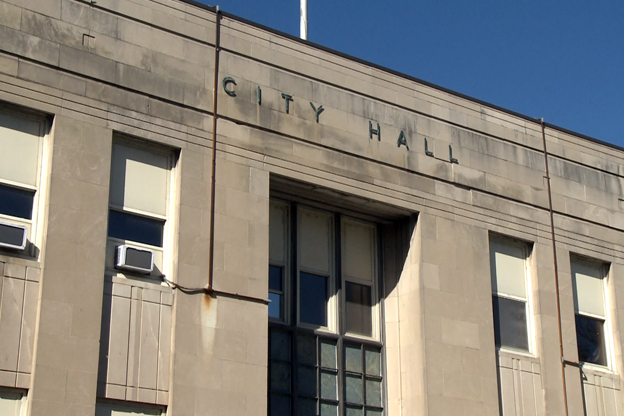
Hren: Let's get into specifics more because this is an issue we talk about with all mayors on this show, what would your plan to be to help boost housing and aging housing?
Bennett: We've got a housing plan that's just recently been completed. We did an inventory of West Central Indiana, but then drilled down to Vigo County and Terre Haute. We know roughly in the city of Terre Haute, we need generally speaking about 2000 new households. It'll be a mix of single family houses, duplexes, multiunit, whatever that might be.
So just last week, the City Council approved $5 million to go into the fund to be able to help developers to build these homes. The county committed $5 million. We've got $900,000 left in the READI funds for housing. And so I would expect next spring we're going to see a tremendous push then to get these builders to build houses and do that over the next few years. It's been a tough one, there hasn't been any way to incentivize them. ARPA funds are allowing us to do that and READI funds - wouldn't be funds that we would normally have available to us. And so we put quite a bit of money on the table to help these builders make the deals work. Their costs have gone up dramatically. As you can imagine interest rates are up, there's a lot of factors working against new housing starts. And so we're hopeful this will make that happen.
Sakbun: We have some of the oldest housing stock in the state of Indiana. That's not just bad from a physical eye perspective, but we're talking lead paint. Really, I would look to use a redevelopment housing director to use redevelopment funds and incoming casino funds to create a kind of 1000 homes and 1000 days type mindset. How are we rebuilding our vacant lots, our condemned properties, our dilapidated properties. Well, with the rise in construction costs and the massive infrastructure costs to connect to a sewage line, to electricity, again, the basics - the government now has to cover some of those costs and make it profitable for builders.
So I look to cover that through two ways. One is a micro-grant program for those individuals that want to purchase one house at a time and those who want to purchase five or more. We've done calculations of about $10,000 to $15,000, some of these grants we can use and there's money in the budget for it, it clearly shows it. The redevelopment funds are in the positive, we can utilize some of those to invest in the people of Terre Haute. And this type of philosophy literally pays itself off over time. Now we have a new family in this house or a new retired couple in this house paying property tax for properties that were no longer on the tax roll. This is a proven step that other communities have taken and if we don't get on the boat quick, we're going to continue to fall behind in terms of housing.
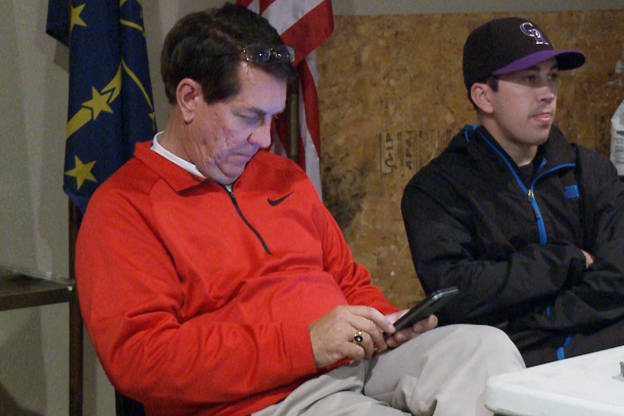
Hren: Let's talk a little about police and fire first responders. I know other cities having trouble competing, trying to keep police officers, and we talked about police reform in Bloomington and here as well. What's your plan going forward?
Bennett: We're pretty solid here. We lose a few to retirement every once awhile, we'll lose one to another community, but not that many. We're getting ready to hire 15 firefighters after the first of the year here. And we had 40 applicants and I don't know where we're at now. But I know we had 40 applicants here most recently, in our police department. We have applicants, so we're getting people to fill these positions. But it's a tougher challenge.
We've got to continue to pay more, we got to continue to make sure we invest in the equipment and the technology and the things they need to do their job. We've done a lot of that. But you got to keep doing that, you have to make sure this work environment is competitive with others so we don't lose people to other communities. So I feel like we're doing okay, we need to do better and do more in the future as we move forward. But we're holding our own with being able to fill positions.
Sakbun: When you look at entry level pay, we are behind other communities. The Indiana State Police is down to $70,000 entry level with lateral transfer pay as well. And we've got to really ensure that the police department and fire department know that when they sign on with the city of Terre Haute, they will be financially taken care of. And how do you do that? Well, part of it is raising entry level pay. Part of it is also looking at benefits packages.
Policing in America has seen vast changes over the last several decades and, different groups across both sides of the aisle have really politicize the concept of being a police officer. I want our police department to know that, yes, the city has their back. And we don't want you to get out of the car when things are bad. But also when things are good. Can an older couple live on a block knowing if they need just a little bit of help, that neighborhood cops can drive by a couple of times a day, a couple of times a week and they know that they personally know them.
And then we really have to have a strong and open conversation about the fact that police officers now are no longer entering and clearing a room with a firearm. Right? They're also mental health professionals. They're also medical professionals and a society has grown more polarized, more frustrating. And it's us versus them. We need to provide them with resources to understand that as times have changed, we have their back too.
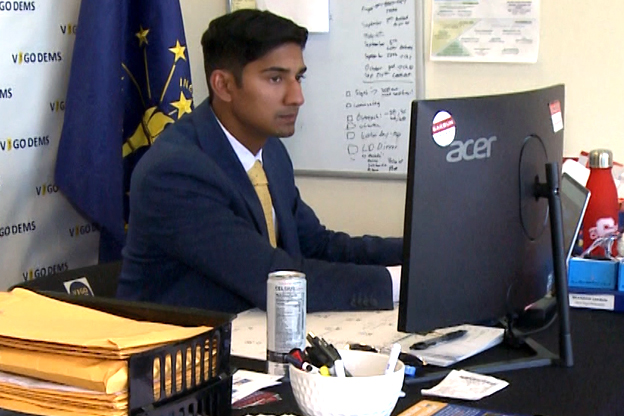
Hren: How about pay for city employees, especially with next year's budget being approved, are they getting market rate?
Bennett: We're giving 3% raises next year, that's what we'd already negotiated with all of our unions, everybody will be getting those 3% raises. And then we haven't looked beyond that too much other than what's in our existing contracts. But our goal will be to raise them as much as we can, you know, it's hard to keep up with that cost of living right now, things cost a lot more, and inflation is hitting everybody. And so we're gonna have to continue to do what we can and squeeze as much out of the budget to be able to give those raises and keep these good folks that work for the city of Terre Haute.
Sakbun: My opponent touts a 39% increase in police and fire over the last 16 years. Folks, that's 2.54% roughly plus or minus. That doesn't match inflation, that doesn't match the rise in housing costs, the rise and cost to send their kids to college, or for skilled labor, we have to have take a serious look at the pay for local government employees. And we're not always going to get it right.
We might not be able to hit that 5% number that I'd like to hit for our bottom third of employees. And sometimes that's having a conversation of well, what benefits can we add when you look at the business sector? A lot of companies are just adding to benefits packages, whether that's time off or the conversation of more time to see mental health providers or physical fitness passes and discounts at local colleges. Those are conversations that should always be ongoing. There's a lot of national level price increases and decreases that sometimes government is slow to react to and we just have got to be better about it.
Read more: Ask The Mayor on WFIU: Regional and Statewide News
Hren: How about a closing statement?
Bennett: I feel really good about what we've done to keep crime down, to be able to build things out from an infrastructure perspective, the economic development side of things, our quality of life initiatives with our community plan. Everything's working really well right now. And so I would ask the voters to give me another four years to help roll out a lot of the things that we've been planning for the last three or four years. Now we have the funds to do that beginning in 2024.
I'd love to be able to ride that wave out and be able to do so many more things in our community. You know, experience does matter. It really does. And I have a tremendous amount of professional experience in my two previous careers. And in this one that has helped me be successful as mayor. I just ask people to get out and vote, you just need to vote. We really need everybody to do that. But two, I would love your support just because I really feel like we're moving in a great direction. We have a tremendous amount of momentum. And I'd love to be able to continue to do this.
Sakbun: I'm thrilled to be here today with you and having the chance to interview not just about myself, but about the city of Terre Haute. And I always keep it focused on that I've got a unique background and unique history. But I think Terre Haute has unique potential to move forward. Financially, the city budgets got a ways to go. And I think if this were a stoplight, we're really flashing yellow because of a declining population, because it's such a low median income.
If we do not change what we are doing, we will not differentiate ourselves from other communities. And if that population continues to fall, that stoplight will hit red. And we've got to avoid that. I'm confident that I can assemble a great team and municipal government to responsibly spend the taxpayers money to ensure that we get a maximum return on investment and we grow the revenue side of the city and that's the population. And we invest in the people through safe, smart neighborhoods through a confident workforce ready to go and most importantly, together, because that's what it's going to take and together, I think we can turn Terre Haute around.









